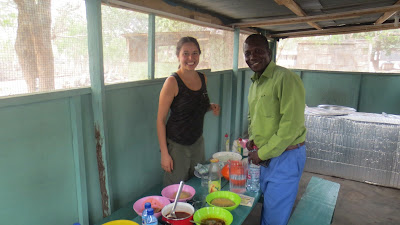Throughout the months here we have also been checking to align the goals of our pilot-scale work at the insectarium with that of a commercial-scale maggot production under local on-farm conditions. We first calculated the amount of waste needed to run all the bays and trays at the insectarium; the quantity of live+dired BSF larvae and kg of frass produced in that week; and the cost for setting up and running this production system. Finally we outlined the following targets:
1: Identify the major green waste handlers in the city
2: Estimate how much green waste those companies throw out per week – where does it go and what happens to it ?
3: Find out the total costs incurred to dispose of it - and potential for separating all plastic and other cardboard wastes from fruits and vegetables before disposing.
We first went to all the major supermarket in town and the managers gave us an insight on the distribution system and key actors in this share of the supply chain. Freshmark, Edentree and Newrest have been stated by our key informant interviewees as the major procurement and distribution arm in the fruit and veg sector. Products (and quantities of) vary seasonally, yet estimations with past records showed supermarket suppliers could be a reliable alternative in Ghana to supply sufficient, constant and nutritious organic green waste to eventual commercial-scale insect producers.
Zoomlion and Asadu Royal Seed Waste Management are the companies those supermarket suppliers usually turn to to dispose of their unsaleable goods. Trucks come and collect the wastes three times a week to bring it to landfill; an expensive service individuals from this sector showed interest in substituting -particularly if it may benefit both their profit and the image of their company.
More on other potential food waste suppliers later...
 |
| Edentree |
 |
| Freshmark |
 |
| Asadu Royal Seed and waste management |








